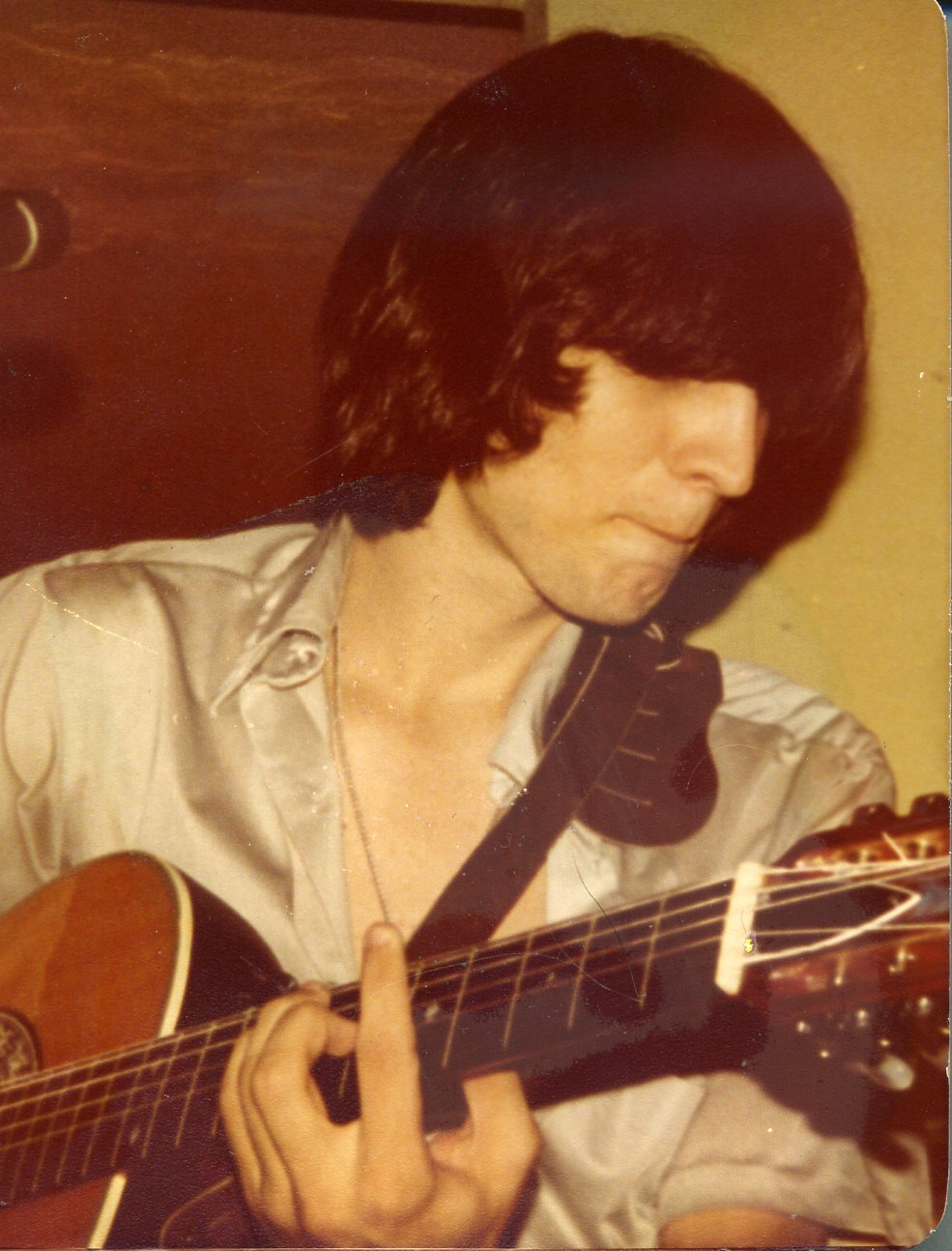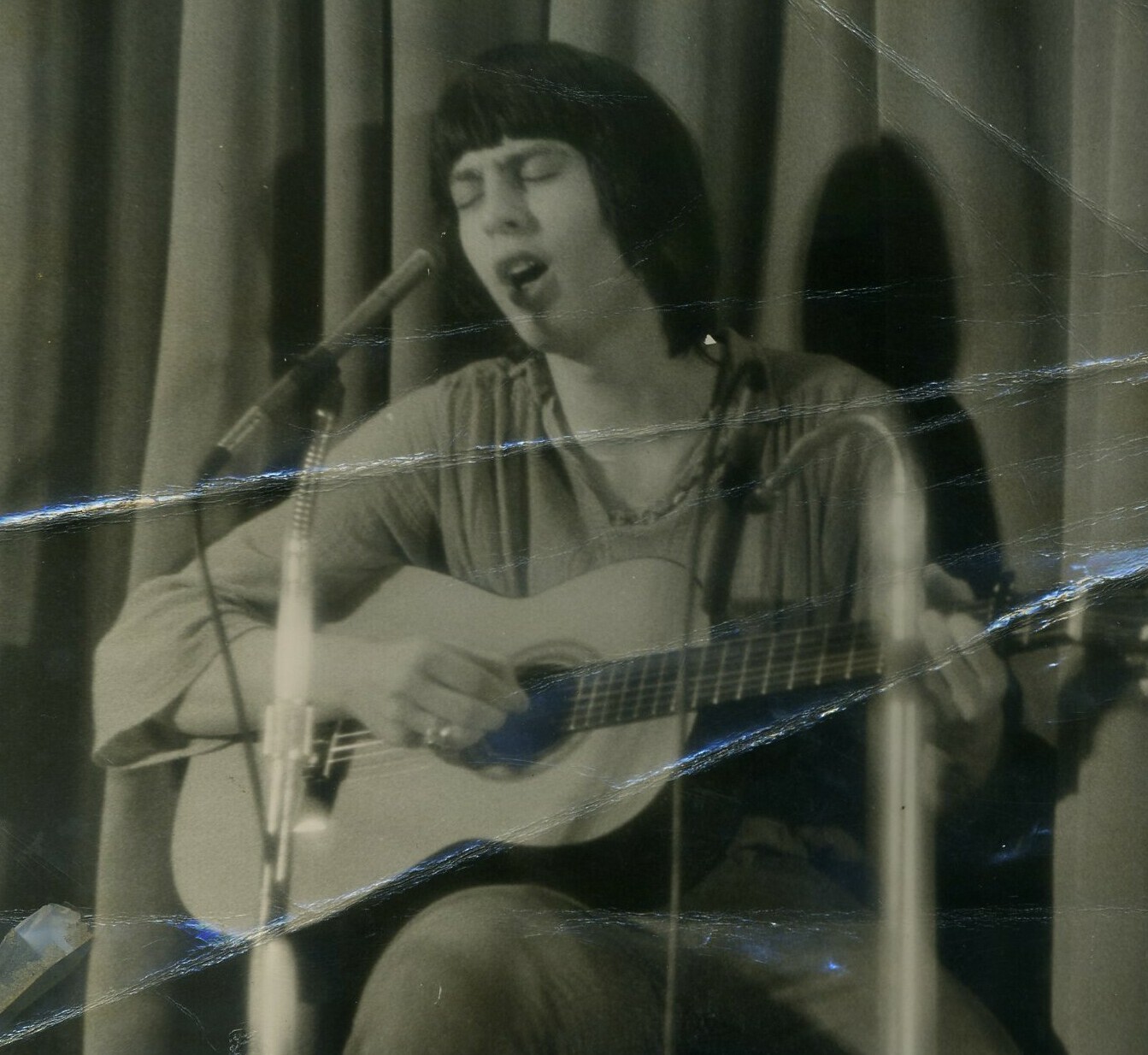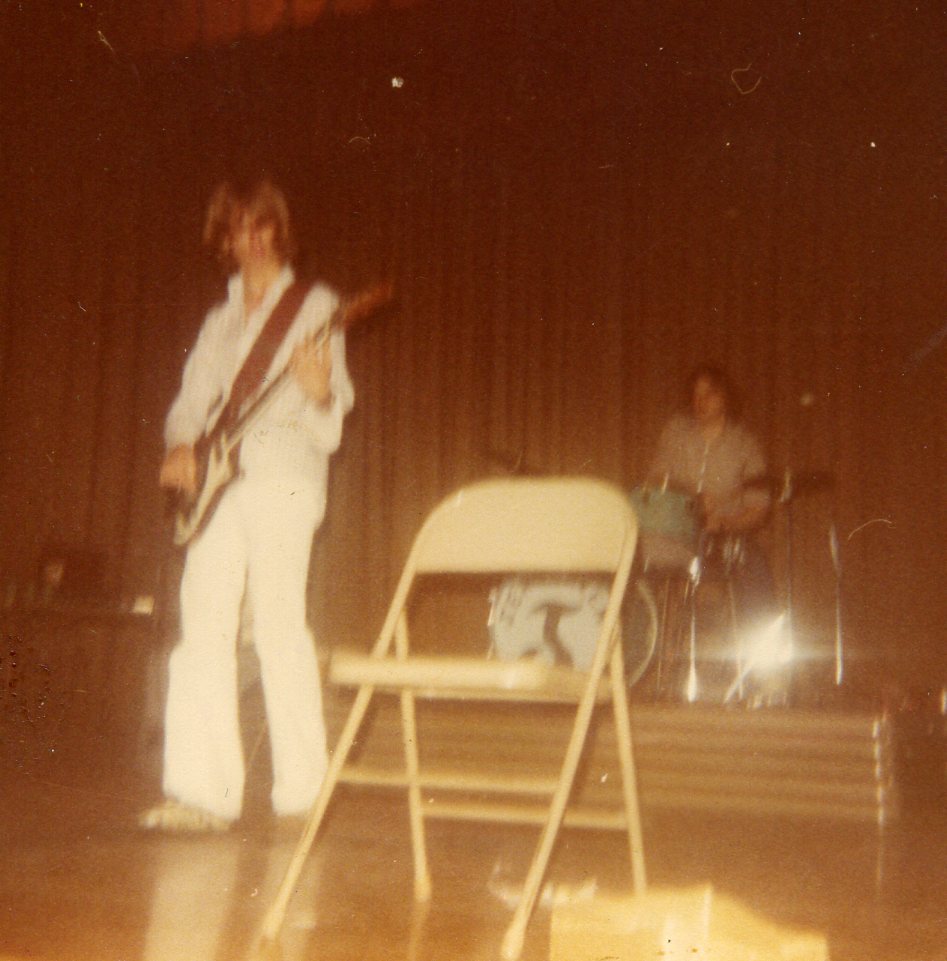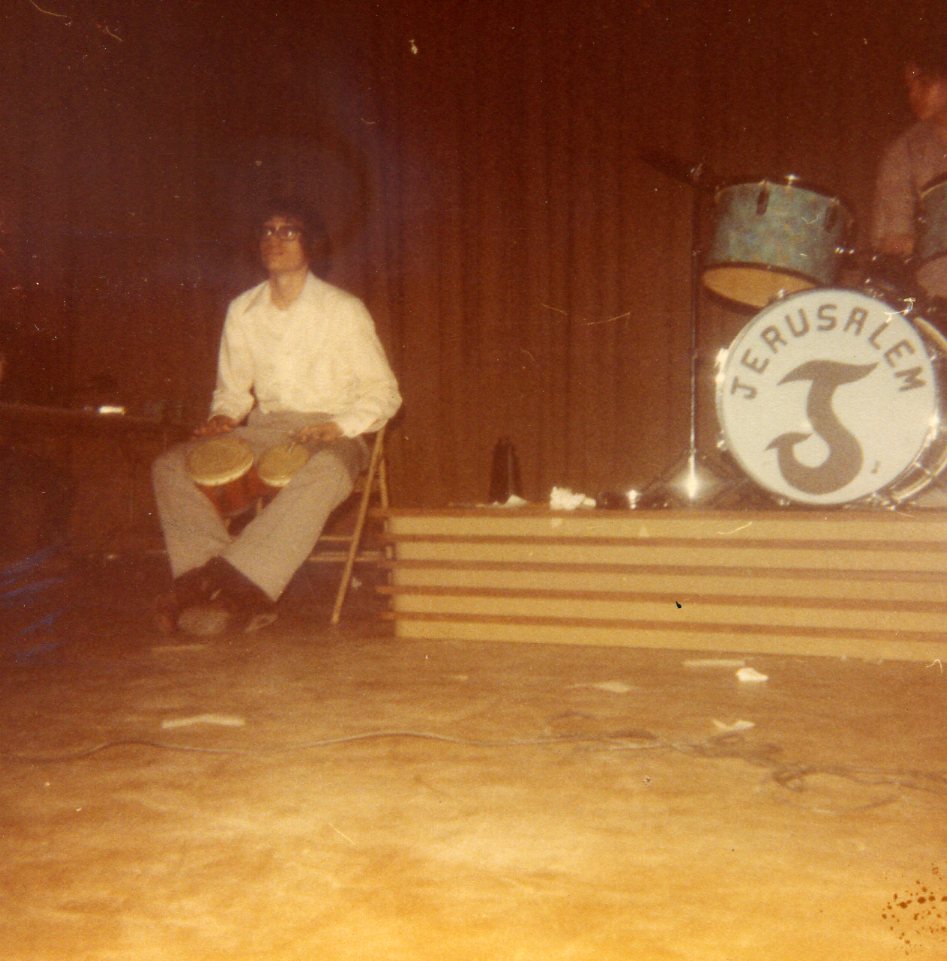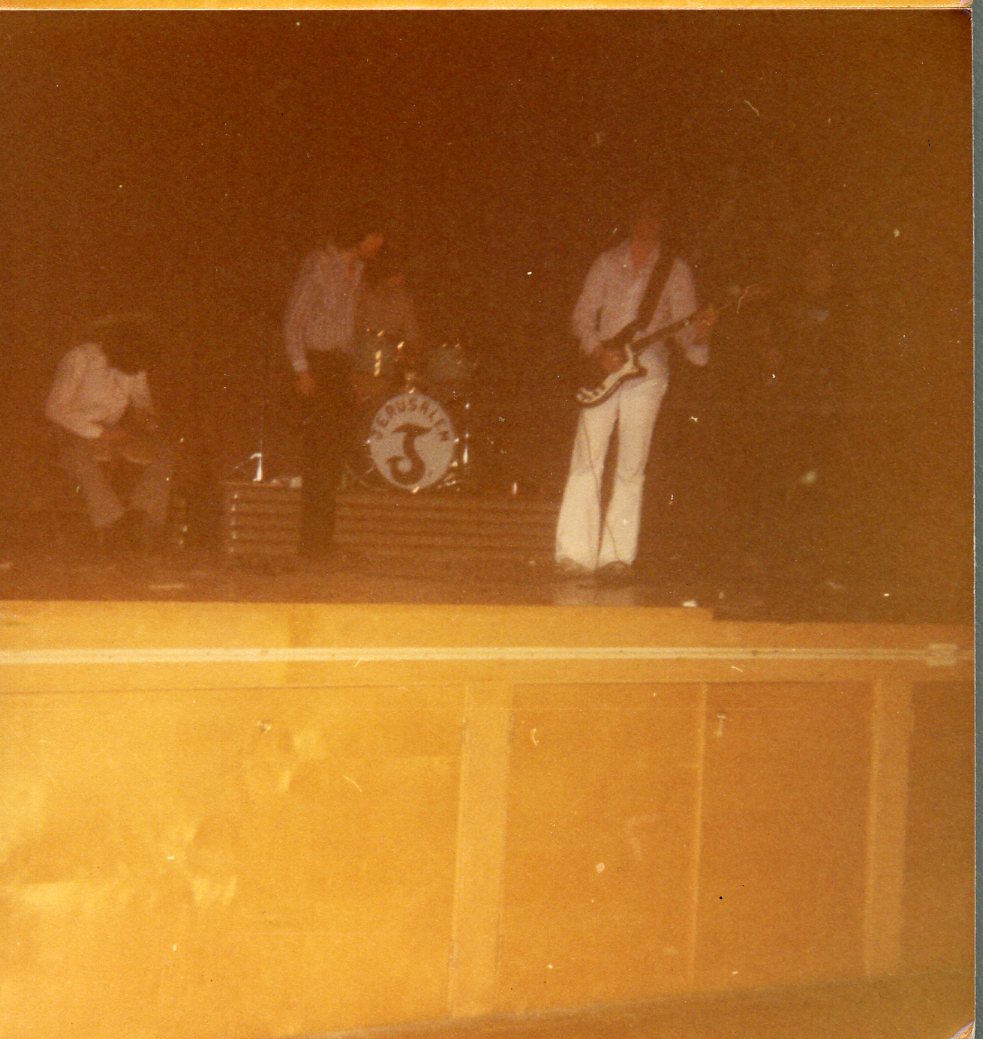|
Every story has its Beginnings.
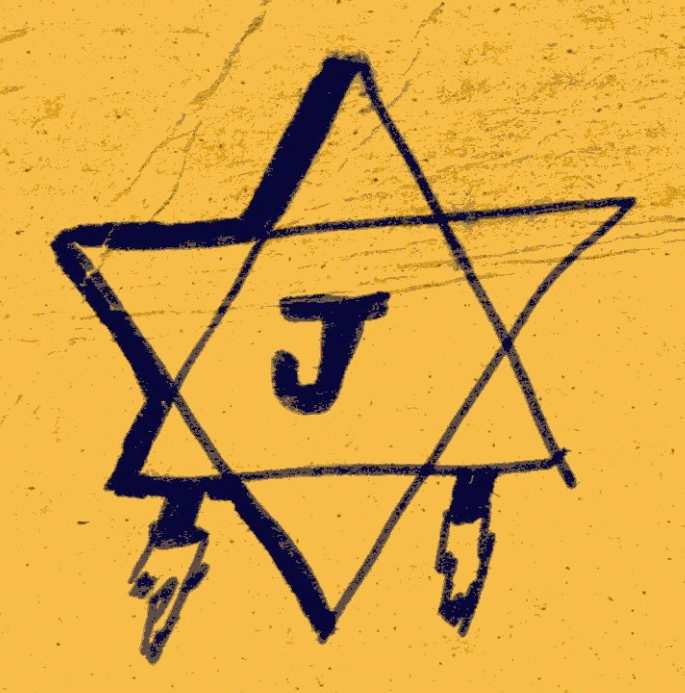
(hand-drawn Jerusalem logo, 1979)
My first attempts to write songs came when I was younger than 10 years old.
They were half-way attempts, to be sure.
I would write new words to songs I already knew.
One of these "lyrics" even caught the attention of the folks at Prevention Magazine, who published my "poem" The Whale Sings,
which was written to the tune of The Moody Blues' Nights In White Satin.
I would write my first complete song when I was 11.
It was called The Omega Man and was inspired by the Charlton Heston film of the same name.
By March of 1973 I had written a handful of songs including a gift for my mother and father's wedding anniversary.
Sadly they wouldn't take the time to listen to the song,
but in spite of their apathy something wonderful happened with the penning of I Love You.
I just wouldn't know it for another seven years.
In 1976 I found myself at Reading Central Catholic High School, where I met the first person with whom I would ever collaborate.
John DeHart was a sax player with the school band, and we became quick friends.
That school year we attended a faculty revue that starred our teachers displaying their various talents.
One such act featured several faculty members pretending to play instruments as a sort of lip-synch band.
John and I were captivated by the idea and planned to do something like it for the students’ version of the revue called the Spring Musicale.
John picked up a Sears Les Paul imitation guitar, and we set about planning our fake break into show business.
But somewhere along the way John decided to learn the instrument for real and discovered that I had actually written some songs.
From that discovery, the band Jerusalem was born.
The name came during a name-thinking session.
We saw that city names were popular.
There was Nazareth, Boston and Chicago, when from my bedroom stereo erupted the
Emerson Lake & Palmer version of the traditional English hymn Jerusalem.
The rest, as they say, was history.
We created a literal starship out of the Star of David by adding exhaust engines and a J in the middle.
It took us a while to figure out why so many people thought these Catholic boys were Jewish.
We formed a band with Mike Trazcuk on bass and Bob Pence on drums.
I was the singer, trying to compete with an electrified band on a 2-inch tape player speaker.
Couldn't yet afford a PA or microphone.
We played school dances and even got thrown out of a redneck bar called the Stonersville Inn.
We played a benefit for MS that attracted only four audience members.
We had rented a rig from Fred's Music, and when he heard our story he refunded us the money on the rental.
Owner Fred Bernardo ended up a part of the family when he married my cousin Dee Dee,
and it's where I stay when I'm back in Reading, PA. Thanks, Fred!
I don't consider myself a great singer.
But one of the qualities that is often remarked upon to this day is my ability to project.
It all had to do with the finances of a beginning band of high school students.
I was the odd man out when it came to equipment.
The bass and guitars had amps, and drums are pretty loud in a basement as we rehearsed.
All I could afford was a small portable cassette player and a small plastic mic.
If you put it in record and monitor mode, you could make the mic deliver sound through the 2-inch speaker.
And I had to learn to project or simply not be heard.
That was a frustrating time, but it ended up providing me with a skill that went beyond singing.
My voice has been an asset to me as a teacher, presenter, and general public speaker,
and I owe it all to a guitarist who thought 10 was the lowest the amp could go and me fighting back with a little 2-inch speaker.
While at Central I fell under the observation of the school's long-time band director Bob Arnold.
He would push me to keep composing and challenge me to have new things written at a moment's notice.
He saw something in me that I never quite saw in myself.
He passed in the mid-80's of a staph infection, and I miss him to this day.
He was the prod behind much of what I learned about songwriting, which frustrates my current bass player to no end.
He ended up pitting me against the school's other significant songwriter, Paul Brown.
In our theory class we were given a week to write and record a new song that would be played and used as the topic for a class.
My entry was In An Endless Space.
I tried to do something edgy because Paul's band White Rock was known as an edge kind of group.
He must have had the same idea and presented a ballad more in my style.
Bob Arnold ended up calling it a tie, and I'm not sure either Paul or I really wanted to see this thing end up in a tie.
His bass player Marty Hill is a successful musician, and we do keep in touch from time to time in spite of the heated rivalry we enjoyed in high school.
A new version of that song ended up on Beginnings.
By our senior year we were taking this stuff pretty seriously. We entered a song called Mountain Song in a national contest,
where it placed honorable mention.
We had a small catalog of songs, won a local talent contest, and decided it was time to hit the recording studio.
A sub shop owned by my parish, Holy Rosary, to fund a shut-in program allowed us to have a sandwich sale to earn the money for the studio time.
Bob Pence was forced out after a rather bad prom night and replaced by Jeff Whennell, and Jerusalem Beginnings was off and running.
The first song selected for the project was that old wedding anniversary gift, I Love You, and it opened the album's collection of 11 songs:
I Love You, Dead Wrong, A Prayer For Song, Baby, Where Are You, Christopher Michael, Ciudad Ley Montanya, Atlantis, Hey Michelle,
Song Of The Siren, In An Endless Space, and Just Before I Say Goodbye.
A Prayer For Song was literally just that.
We had signed up to play three songs in a talent contest, only to discover we actually needed four songs the night before.
We wrote A Prayer For Song that night and won the contest the next day.
Of course, we decided we should be able to do that every day.
Didn't quite work out that way.
Christopher Michael was an odd affair for me.
I placed in a county-wide high school poetry contest that resulted in a weekend with Joyce Carol Oates
and workshop with fellow winners.
But it was a different Carol who would figure into my career.
Carol Chesko was from a different school, and in the workshops she talked about how much she wanted her poems to be like songs.
I pounced on the opening and offered to write music for the piece, and the result was Christopher Michael.
I never ended up getting to date Carol, but we still keep in touch once in a while.
The song touched later drummer Donnie Melvan so much that he named his second son Christopher Michael.
Now that's a touching tribute.
I Love You featured 10 different guitars and was originally intended to showcase what we hoped would be our trademark sound.
The idea was for a guitar orchestra, and it featured such things as a bowed 12-string, classical, and other guitars.
It included an idea we thought we'd invented but likely didn't.
It was called a high-strung guitar and was a 6-string strung with just the octave strings from a traditional 12-string.
John played several acoustic and electric guitars, and one was intended to sound a bit like a sax,
which I first hoped would be my Dad playing with us.
It was a fun and unique idea, but on our budget it wasn't something we could sustain for the entire recording,
so this song stands out as the lone example of that idea.
Just Before I Say Goodbye figured to be a good song to end an album with.
John's lead guitar dripped with reverb, and it was nicknamed “the final sounds of Herbie the Dying Whale”.
Still brings a smile to my face that after 40 years Herbie managed to hang on for a little while longer.
The album was engineered by Reading's Jake Hain, at whose consoles I would get my first lessons in the recording process.
Jake taught me stuff that is still valuable today, and he was generous with the studio clock,
knowing we didn't have a lot of bread even after selling so many subs.
The process ignited something that never quite died, and the first album was in the can by the end of June 1979.
The first place I took a copy was to a guitar teacher who earlier told my mother: "He will never play guitar".
He was kind about it and spent the time listening to the entire album, offering heartfelt congratulations.
And they said it couldn't be done, when in fact it was barely begun.
The band for this album was:
G. E. Sassani (vocals/guitars),
John DeHart (guitars),
Mike Trazcuk (bass) and
Jeff Whennell (drums).
|
